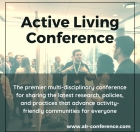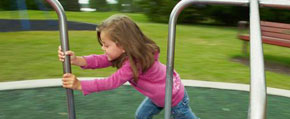7:15 a.m. - 4:30 p.m. Conference Registration
7:30 a.m. - 8:30 a.m. Breakfast and Roundtable Discussions
8:30 a.m. - 9:00 a.m. Overview and Technology & Resource Announcements
James F. Sallis, Ph.D., Director, Active Living Research
Technology Vendors in Attendance
9:00 a.m. - 10:00 a.m. Keynote Speaker Presentation
Jonathan Lever, National Director, Activate America, YMCA of the USA
When 1 + 1 = 3: Developing a Collaboration Strategy that Endures [pdf]
The conventional wisdom is that collaboration is essential to advancing public health and healthier communities - going it alone is no longer a viable option or compelling strategy. But creating value-added collaborations is messier, more complex, and more time consuming that most people care to admit. Using the YMCA's experience over the past six years, the purpose of this session is to share lessons learned in building partnerships between Academia and community-based organizations, as well as between community-based organizations and the public and private sectors.
10:00 a.m. - 10:30 a.m. Active Living Research: Translating Research to Policy Award Presentation
Award Presenter: James F. Sallis, Ph.D., Director, Active Living Research
Award Presentation: NYC Active Design Guidelines: Promoting Physical Activity and Health in Design
10:30 a.m. - 10:45 a.m. Break
10:45 a.m. - 12:15 p.m. Conference (Concurrent) Workshops
1) Communicating for Policy Change [pdf]
Laurie Lennon, M.S., Senior Associate for Public Health, Burness Communications
Elizabeth Wenk, M.A., Senior Associate for Public Policy, Burness Communications
The goal of this workshop is to help researchers effectively communicate in writing to policy-makers, advocates, media and other non-research audiences. This will be a highly interactive workshop that focuses on identifying key research findings and presenting them in a way that resonates with important audience groups. Participants will be divided into small groups to review current studies and devise summaries that clearly explain the key messages and strongest, most policy salient findings. Examples of work that have influenced policy will be shared in a case study format. Participants will be asked to complete a pre-workshop survey. This session will be limited to 40 participants.
Learning Objectives
- Learn how to identify the most important findings and overarching messages from a study.
- Learn how to identify important audience groups.
- Practice drafting clear, concise messages about research findings.
- Increase knowledge of policy opportunities relevant to obesity prevention.
2) National Collaborative on Childhood Obesity Research (NCCOR) Online Tools for Researchers and Practitioners [pdf]
Susan Krebs-Smith, Ph.D., National Cancer Institute
Heather R. Bowles, Ph.D., National Cancer Institute
The National Collaborative on Childhood Obesity Research (NCCOR) brings together four of the nation's leading research funders - the Centers for Disease Control and Prevention (CDC), the National Institutes of Health (NIH), the Robert Wood Johnson Foundation (RWJF), and the United States Department of Agriculture (USDA) - to address the problem of childhood obesity in America. This workshop will describe tools from the award-winning NCCOR collaborative. The first tool to be described will be a searchable online registry of more than 500 childhood obesity-relevant measures of diet and physical activity behaviors and diet- and physical activity-related environmental variables. The second tool described will be a catalog of open-access US surveillance system data related to childhood obesity research. Both online resources will be available in early 2011. Finally, speakers will describe multiple NCCOR activities related to program development, educational activities, and systems analysis of social demographic and institutional factors influencing the dynamics of child obesity. ALR attendees will be provided a multi-sectoral perspective on future research directions and tool development in the area of behavioral science related to childhood obesity.
Learning Objectives
- Learn about the history and activities of NCCOR.
- Understand the extent of the online resources created by NCCOR.
- Become aware of future directions of NCCOR.
3) Collecting and Processing Global Positioning System (GPS) Data for Active Living Research
Workshop Presentation - Part 1 [pdf] and Part 2 [pdf]
Jacqueline Kerr, Ph.D., University of California, San Diego
Jasper Schipperijn, Ph.D., University of Southern Denmark
Fredric Raab, University of California, San Diego
Scott Duncan, Auckland University of Technology, New Zealand
The availability of small, low-cost GPS data loggers enables researchers to track the location of individuals and, when matched with accelerometers, to identify where participants are active. How does one incorporate such data into a study? What additional insights does it provide? This workshop will cover: 1) appropriate research questions that can be answered using GPS; 2) best practices for GPS data collection in the real world; 3) typical problems and how to avoid them; 4) algorithms for processing GPS data to extract research variables; and 5) visualization techniques and temporal-spatial analysis tools for Geographic Information Systems (GIS). Examples from previous and current projects will be used and sample protocols will be shared. Preliminary results of an on-going validation study will be discussed including methods others can use to validate their data. The workshop will include a break out session with four stations: 1) data collection; 2) data processing; 3) GIS; and 4) new technologies.
Learning Objectives
- Understand for which research questions the use of GPS is relevant.
- Learn best practices of GPS data collecting in free-living studies.
- Learn about algorithms for cleaning, processing and categorizing GPS data.
- Understand how to validate GPS data.
- Learn how to create temporal spatial variables in GIS using GPS data.
4) From Advocacy to Activism: Applying the National Think Tank for African American Progress Model of Community Engagement to Health Promotion [pdf]
Janice Johnson Dias, Ph.D., John Jay College of Criminal Justice
Leon Caldwell, Ph.D., President and CEO, The National Think Tank for African American Progress
The National Think Tank for African American Progress (NTTAP) is an organization dedicated to gathering and disseminating research in underserved and underrepresented communities for the purpose of mobilizing the collective genius of a community. Based on the principles of Ujima (collective work and responsibility) and Kujichagulia (self determination) NTTAP partners with community members in developing and implementing solutions to its challenges. In addition, NTTAP gathers academic researchers to translate and apply their research to community specific solutions. NTTAP's multisystem approach toward health promotion includes community driven solutions in education, economic/community development, and STEM (science, technology, engineering, and math). Participants will be encouraged to move their research from advocating for social justice to participants in scholar-activism.
Learning Objectives
- Understand the core concepts of NTTAP.
- Learn the NTTAP process of community and researcher collaboration in Memphis, Tennessee and Long Island, New York with a focus on obesity prevention activities.
- Develop measures of community impact.
12:15 p.m. - 1:45 p.m. Lunch
1:45 p.m. - 3:15 p.m. Concurrent Presentation Sessions
SESSION 1 - GPS Methods and Applications
a) Positional Accuracy of Six Different Portable GPS Receivers, Scott Duncan, Ph.D., Auckland University of Technology, New Zealand
b) Green Spaces in Healthy Places: Objective Data Demonstrates an Association between Greenness and Momentary Measures of Physical Activity in Children, Estela Almanza, M.P.H., University of California, Berkeley
c) Physical Activity Among Teenagers in a Multi-Ethnic Neighborhood in Copenhagen, Denmark: Combining GPS and Accelerometer Data Using PALMS and ArcGIS, Jasper Schipperijn, Ph.D., University of Southern Denmark
d) Methodological Issues in the Combined Use of GPS, GIS and Accelerometry in Research on Greenspace and Physical Activity with Adolescents, Justine Geyer, M.Sc., University of Edinburgh, Scotland
SESSION 2 - Active Living and Latinos
a) Hispanic Perceptions of Neighborhood Safety and Child's Physical Activity, Norma Olvera, Ph.D., University of Houston
b) Physical Activity Levels in an Urban New Immigrant Latino Community, Flavia C. Perea, Ph.D., Tufts University School of Medicine
c) Perceived Constraints to Leisure Time Physical Activity Among Latinos, Jonathan Casper, Ph.D., North Carolina State University
d) The Role of Landscape Spatial Patterns on Childhood Obesity and Quality of Life: A Study of Hispanic Children in Inner-City Neighborhoods, Jun-Hyun Kim, Ph.D., California Polytechnic State University
SESSION 3 - Active Transportation to School
a) Considering Path Quality When Exploring Environmental Determinants of Walking to School, Nathan James, Sc.M., Johns Hopkins Bloomberg School of Public Health
b) School Audit Instrument: Assessing Safety and Walkability of School Environments, Chanam Lee, Ph.D., Texas A&M University
c) The Impact of State Safe Routes to School-Related Laws on Elementary School Walking and Biking Policies and Practices, Jamie Chriqui, Ph.D., University of Illinois at Chicago
d) Economic Investment and Program Implementation in Low-Resource Communities: Safe Routes to School, Angie Cradock, Sc.D., Harvard School of Public Health
3:15 p.m. - 3:30 p.m. Break
Change clothes for physical activity breaks.
3:30 p.m. - 5:30 p.m. Physical Activity Breaks
Activities included:
- Yoga Session
- Embarcadero (Waterfront) Walk
- Downtown Walk
- Running Group
- African Dance Workout
- Self-Guided Walk
5:30 p.m. - 7:30 p.m. Poster and Technology Session and Reception
Poster Abstracts [pdf]
Technology Vendors included:
• ACCUSPLIT
• ActiGraph, LLC
• New-Lifestyles, Inc.
7:30 p.m. - 9:30 p.m. Dance Event







